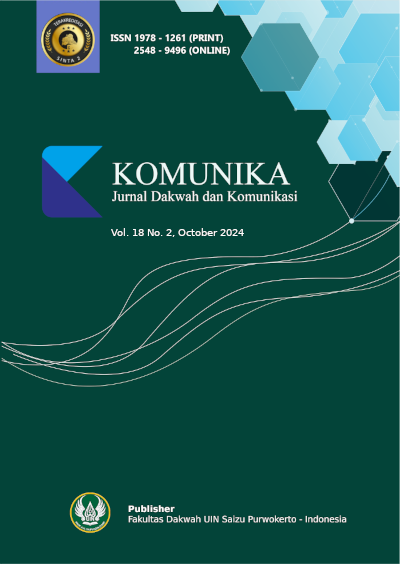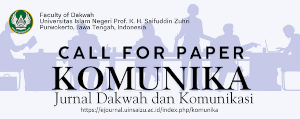Articulating the Interests of Disability Groups: Utilization of Social Media in Kudus Regency, Indonesia
DOI:
https://doi.org/10.24090/komunika.v18i2.10951Keywords:
disability group, local regulation, social mediaAbstract
As a minority group, Disability Communication Forum of Kudus Regency (FKDK) uses social media to advocate and carry out social change. This research aims to explore the utilization of social media to articulate the interests of disability groups. This research employed a descriptive-qualitative method. The primary data are collected from in-depth interviews with the chairman of a disability organization, disability activists, and a regional parliament member. Meanwhile, the secondary data are collected from journals, books, and websites related to this issue. This research defines social media usage for Disability Communication Forum of Kudus Regency (FKDK) to encourage the passing of Local Regulations regarding the protection and fulfillment of disability rights. They mobilize communities, raise awareness through sharing videos and photographs, and use media as a fundraising instrument. Social media empowers marginalized groups by providing a platform to articulate their interests, advocate for rights, and facilitate social justice movements. It enhances accessibility, promotes community mobilization, and offers innovative fundraising opportunities. Advocacy groups leverage social media strategically for policy influence, public engagement, and collaboration. However, addressing digital regulation is crucial to ensure inclusivity and digital advocacy endeavors benefit all community members.Downloads
References
Adioetomo, S. M., Mont, D., & Irwanto. (2014). Persons with Disabilities in Indonesia : Empirical Facts and Implications for Social Protection Policies. https://www.tnp2k.go.id/images/uploads/downloads/Disabilities report Final sept2014 (1).pdf
Cameron, L., & Suarez, D. C. (2017). Disability in Indonesia : What can we learn from the data? In Australia Indonesia Partnership for Economic Governance (Issue August).
Easton, D. (1953). The Political System : An Inquiry into the State of Political Science. Knof.
Flore, M., Balahur, A., Podavini, A., & Verile, M. (2019). Understanding Citizen’s Vulnerabilities to Disinformation and Data-Driven Propaganda.
Fossey, E., Harvey, C., Mcdermott, F., & Davidson, L. (2002). Understanding and Evaluating Qualitative Research. Australian & New Zealand Journal of Psychiatry, 36(6), 717–732. https://doi.org/10.1046/j.1440-1614.2002.01100.x
Hidayati, R., Izzah, N., Nindya, N. N., Syafitri, D., & Hidayat, M. I. (2020). Pendampingan Pembuatan Kreasi Eceng Gondok pada Anggota Forum Komunikasi Disabilitas Kudus (FKDK). E-Dimas: Jurnal Pengabdian Kepada Masyarakat, 11(1), 7. https://doi.org/10.26877/e-dimas.v11i1.2466
Ibrahim, I. S., & Iriantara, Y. (2017). Komunikasi yang Mengubah Dunia: Revolusi dari Aksara hingga Media Sosial. Simbiosa Rekatama Media.
Irwanto, Kasim, R. E., Fransiska, A., Lusli, M., & Siradj, O. (2010). The situation of people with Disability in Indonesia: a desk review. https://www.ilo.org/wcmsp5/groups/public/---asia/---ro-bangkok/---ilo-jakarta/documents/publication/wcms_160341.pdf
Karki, K. T. (2023). Role of Social Media in Facilitating Social Justice Movements and Advocacy in the Field of Social Work. STM Journals, 13(3).
Kementerian Sosial RI. (2021). Pedoman Operasional Asistensi Rehabilitasi Sosial Penyandang Disabilitas. https://kemensos.go.id/uploads/topics/16384433731911.pdf
Kustiani, R. (2019). Baru 12 Provinsi di Indonesia yang Punya Perda Disabilitas. Tempo. Co. https://difabel.tempo.co/read/1238651/baru-12-provinsi-di-indonesia-yang-punya-perda-disabilitas
Kusumastuti, M. N. S. A. (2016). Perlindungan Hukum dari Diskriminasi Bagi Penyandang Disabilitas dalam Dunia Kerja. Universitas Atma Jaya Yogyakarta.
Latipah. (2017). Diskriminasi Hukum Terhadap Kaum Difabel. Buletin Hukum Dan Keadilan, 1(6B), 53–54.
Nisa, U. (2018). Stigma Disabilitas dalam Perspektif Orang Tua Anak Difabel di DI Yogyakarta. UIN Sunan Kalijaga.
Nuruddin. (2018). Media Sosial: Agama Baru Masyarakat Milenial. Intrans Publishing.
Paikah, N. (2017). Implementasi Undang-Undang Nomor 8 Tahun 2016 tentang Penyandang Disabilitas dalam Perlindungan dan Pemenuhan Hak Penyandang Disabilitas di Kabupaten Bone. Ekspose, 16, 335–348. https://doi.org/10.30863/ekspose.v16i1.91
Prodi Pemikiran Politik Islam IAIN Kudus. (2022). Bedah Naskah Akademik Ranperda Disabilitas Kabupaten Kudus : Kajian Teoritis dan Praktis, 2021.
Qodarsasi, U. (2021). Partisipasi Pemilih Disabilitas Dalam Pemilihan Kepala Daerah (Pilkada) Kabupaten Kudus Tahun 2018. IJTIMAIYA: Journal of Social Science Teaching, 5(1), 87. https://doi.org/10.21043/ji.v5i1.10159
Roni, A. Y. (2022). Latar Belakang Perda Disabilitas Kabupaten Kudus.
Surwanti, A., & Ma’ruf, A. (2018). Advokasi Mewujudkan Peraturan Daerah Tentang Penyandang Disabilitas Di Tingkat Kabupaten. BERDIKARI : Jurnal Inovasi Dan Penerapan Ipteks, 6(1), 109–118. https://doi.org/10.18196/bdr.6138
United Nations. (2014). The Convention on The Rights of Persons With Disabilities. United Nations. https://www.ohchr.org/Documents/Publications/CRPD_TrainingGuide_PTS19_EN Accessible.pdf
Yulianto, R. (2022). Latar Belakang FKDK.
Downloads
Published
Issue
Section
License
Copyright (c) 2024 Ahmad Zaini, Umi Qodarsasi, Muhammad Fawwaz

This work is licensed under a Creative Commons Attribution-ShareAlike 4.0 International License.
Authors who publish with this journal agree to the following terms:
- Authors retain copyright and grant the journal right of first publication with the work simultaneously licensed under a Creative Commons Attribution-ShareAlike 4.0 International License that allows others to share the work with an acknowledgement of the work's authorship and initial publication in this journal.
- Authors are able to enter into separate, additional contractual arrangements for the non-exclusive distribution of the journal's published version of the work (e.g., post it to an institutional repository or publish it in a book), with an acknowledgement of its initial publication in this journal.
- Authors are permitted and encouraged to post their work online (e.g., in institutional repositories or on their website) prior to and during the submission process, as it can lead to productive exchanges, as well as earlier and greater citation of published work (See The Effect of Open Access).

























